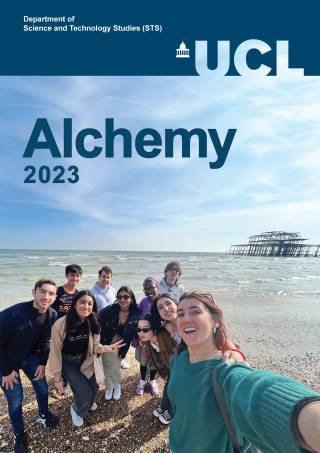Frequently asked questions related to UCL Department of Science and Technology Studies (STS).
These are frequently asked questions about
- What is STS's status for Athena SWAN?
In 2015, STS received an Athena SWAN Bronze Award.
- How old is the Department?
In 1921 University College London established the first university department in Britain in the field of history and philosophy of science. The Department has offered graduate degrees since then, and many leading scholars in this field began their careers with degrees from UCL. In 1993 an undergraduate BSc programme was launched, with an expanded staff that also included scholars in science communication and science policy.
The department received its current name in 1994. It had been the "Department of History and Philosophy of Science" from 1938 to 1994, and previously was the "Department of History and Method of Science" from 1921 to 1938. To reflect the widening interdisciplinary nature of our work, the name of the department was changed in 1994 to the Department of Science & Technology Studies (STS).
STS is unique in the UK in combining – in one department - teaching and research in history and philosophy of science with social studies of science (including science policy, public understanding of science and science communication).
In 1924 the Department launched its first Masters degree. In 1987 postgraduate teaching in our department was merged with similar activities at Imperial College London and the then Wellcome Institute to create the London Centre for the History of Science, Medicine and Technology. At its inception, this was the only such programme in the UK. A decade later, staff were boasting, "we lead the field in feeding outstanding students into PhD programmes and research careers."
Wikipedia article for the department.
- Does STS operate a e-mailing list
Yes. STS operates a email list for those who want to be kept up-to-date on our activities and not use other channels, such as @stsucl on Twitter or our Facebook page. Please enter your details on the Microsoft form here:
We do not share addresses, and we do not send materials other than announcements of department activities and events.
- How does STS Manage Sustainability and Green Impact?
STS promotes sustainability and is proud to be part of the UCL Green Impact initiative.
Details of the UCL Sustainability strategy and policy can be found on the Sustainability pageof the Green UCL Website.
Staff and students can show their support by adding the UCL Green Impact banner to emails:
For advice on how to help the department meet their sustainability targets, please contact either of the departmental Green Champions - Lori Coletti Campbell or Malcolm Chalmers.
FAQ:
How do I…?
…dispose of paper?
We have various recycling bins throughout the building. If you need to dispose of confidential waste, the professional services team in G2 have confidential waste bins you can use.…dispose of batteries?
The department has a bin for disposal of batteries in the ground floor post room.…dispose of equipment?
If you have an item that you no longer need which could be re-used (furniture, tech, storage etc), speak to Malcolm Chalmers – your item might be suitable for recycling via WarpIt!…find answers to any other questions?
If you have any other questions regarding sustainability or green issues, contact either of the department’s Green Champions – Lori Coletti Campbell or Malcolm Chalmers- Who was Alice Farrands (re: Alice Farrands Room)
Alice was a PhD student in STS who died of cancer in 2007. She was nearing completion of her PhD about policy making in the regulation of stem cell research. A prominent feature of this research was a large series of interviews with science policy makers, legislators, and scientists. A related project was her alice_farrands_postpn243.pdf. Alice taught in the department, and she worked on several research projects with staff. She's sorely missed. In her memory, we've dedicated the graduate students' room as the "Alice Farrands Room".
 Close
Close


